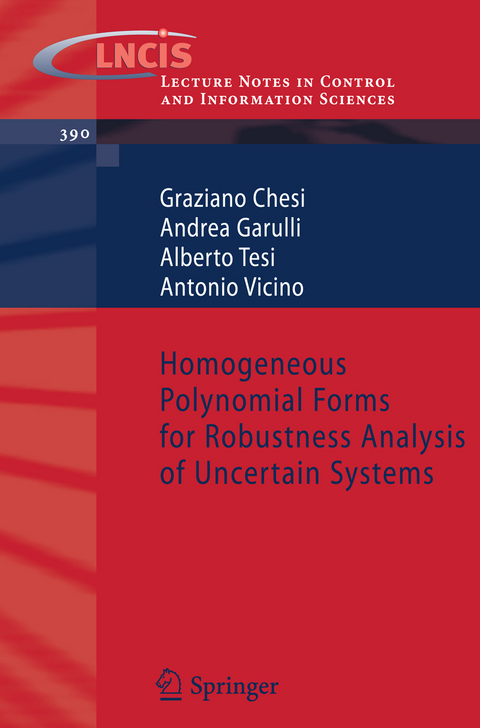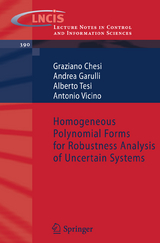Homogeneous Polynomial Forms for Robustness Analysis of Uncertain Systems
Seiten
2009
Springer London Ltd (Verlag)
978-1-84882-780-6 (ISBN)
Springer London Ltd (Verlag)
978-1-84882-780-6 (ISBN)
This book presents a number of techniques for robustness analysis of uncertain systems. In it, convex relaxations for several robustness problems are derived by exploiting and providing new results on the theory of homogenous polynomial forms.
It is well known that a large number of problems relevant to the control ?eld can be formulatedas optimizationproblems. For long time, the classical approachhas been to look for a closed form solution to the speci?c optimizationproblems at hand. The last decade has seen a noticeable shift in the meaning of "closed form" solution. The formidable increase of computationalpower has dramatically changed the fe- ing of theoreticians as well as of practitioners about what is meant by tractable and untractableproblems. A main issue regardsconvexity. From a theoretical viewpoint, there has been a large amount of work in the directions of "convexifying" nonc- vex problems and studying structural features of convex problems. On the other hand, extremely powerful algorithmsfor the solution of convexproblemshave been devised in the last two decades. Clearly, the fact that a wide variety of engine- ing problems can be formulated as convex problems has strongly motivated efforts in this direction. The control ?eld is not an exception in this sense: many pr- lems in robust control, identi?cation and nonlinear control have been recognized as convex problems.
Moreover, convex relaxations of nonconvex problems have been intensively investigated, as they provide an effective tool for bounding the optimal solution of the original problem. As far as robust control is concerned, it is known since long time that several classes of problemscan be reducedto testing positivity of suitable polynomials.
It is well known that a large number of problems relevant to the control ?eld can be formulatedas optimizationproblems. For long time, the classical approachhas been to look for a closed form solution to the speci?c optimizationproblems at hand. The last decade has seen a noticeable shift in the meaning of "closed form" solution. The formidable increase of computationalpower has dramatically changed the fe- ing of theoreticians as well as of practitioners about what is meant by tractable and untractableproblems. A main issue regardsconvexity. From a theoretical viewpoint, there has been a large amount of work in the directions of "convexifying" nonc- vex problems and studying structural features of convex problems. On the other hand, extremely powerful algorithmsfor the solution of convexproblemshave been devised in the last two decades. Clearly, the fact that a wide variety of engine- ing problems can be formulated as convex problems has strongly motivated efforts in this direction. The control ?eld is not an exception in this sense: many pr- lems in robust control, identi?cation and nonlinear control have been recognized as convex problems.
Moreover, convex relaxations of nonconvex problems have been intensively investigated, as they provide an effective tool for bounding the optimal solution of the original problem. As far as robust control is concerned, it is known since long time that several classes of problemscan be reducedto testing positivity of suitable polynomials.
Positive Forms.- Positivity Gap.- Robustness with Time-varying Uncertainty.- Robustness with Time-invariant Uncertainty.- Robustness with Bounded-rate Time-varying Uncertainty.- Distance Problems with Applications to Robust Control.
| Erscheint lt. Verlag | 21.7.2009 |
|---|---|
| Reihe/Serie | Lecture Notes in Control and Information Sciences ; 390 |
| Zusatzinfo | 17 Illustrations, black and white; XVIII, 198 p. 17 illus. |
| Verlagsort | England |
| Sprache | englisch |
| Maße | 155 x 235 mm |
| Themenwelt | Mathematik / Informatik ► Mathematik ► Algebra |
| Mathematik / Informatik ► Mathematik ► Angewandte Mathematik | |
| Mathematik / Informatik ► Mathematik ► Finanz- / Wirtschaftsmathematik | |
| Technik ► Elektrotechnik / Energietechnik | |
| Technik ► Maschinenbau | |
| ISBN-10 | 1-84882-780-6 / 1848827806 |
| ISBN-13 | 978-1-84882-780-6 / 9781848827806 |
| Zustand | Neuware |
| Informationen gemäß Produktsicherheitsverordnung (GPSR) | |
| Haben Sie eine Frage zum Produkt? |
Mehr entdecken
aus dem Bereich
aus dem Bereich
Buch | Softcover (2022)
Springer Spektrum (Verlag)
CHF 55,95




